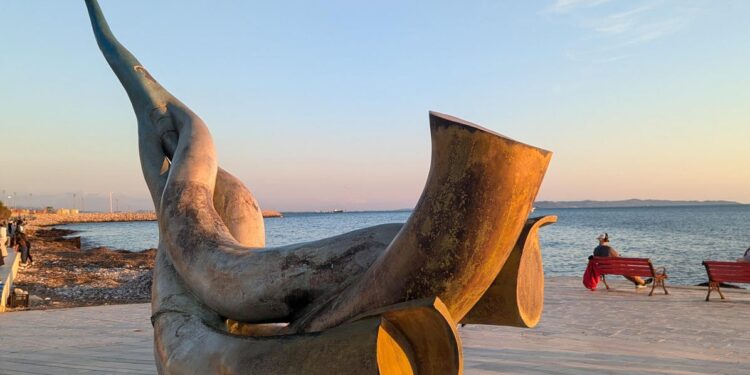A contemporary sculpture near the beach at Durres, Albania
Bruce Dorminey
The tiny Mediterranean enclave of Albania had for decades been one of the most politically isolated countries on Earth. Sandwiched between Kosovo and Montenegro on the north and Greece to its south, the country’s post-World War II isolationism had by the 1990s begun to ease, giving way to an unprecedented era of western-styled openness and economic opportunity.
Yet recent climate change, coupled with an unbridled influx of tourists eager to soak up the sun on Albania’s abundant coastline, is complicating the country’s future.
That’s because Albania’s application for entry into the European Union is partially contingent on adhering to the EU’s strict environmental protection regulations. At risk is not only entry into the EU, but potentially the loss of billions of dollars in aid that could follow.
Yet a local geographer at the University of Tirana is hopeful that Albania can successfully mitigate climate change’s effects locally while convincing the EU that it is an environmental team player. That is, all without sacrificing sustainable economic growth.
Climate change is a problem for Albania; heavy rainfalls cause floods and heatwaves cause long periods of droughts affecting people’s lives and the economy, Sonila Papathimiu, a geographer at the University of Tirana in Albania, told me in her office. Changes in temperature and precipitation have a direct impact on agriculture, especially in the western lowlands which have a more Mediterranean climate, she said.
Satellites and geographic information system technology provide real-time data during floods or wildfires.
This technology also offers information on rainfall distribution and drought severity, as well as data to improve disaster response and planning, said Papathimiu. In addition, such data allows researchers to assess changes in vegetation through metrics such as the Normalized Difference Vegetation Index, she noted.
This NDVI index helps in understanding how climate change affects agricultural productivity and natural ecosystems in Albania, said Papathimiu. Analysis of Land Use and Land Cover changes over time also helps to reveal and understand patterns of urbanization, deforestation and land degradation, which have intensified due to climate change, she said.
A Biodiversity Hotspot
The Vjosa River basin, a cornerstone of Albania’s abundant natural resources, is threatened by both climate change and foreign nationals who are rushing in to build vacation homes near the country’s popular southern beaches.
The Vjosa is only one of nine so-called “Wild Rivers” in Europe, which means that the river remains in its natural direction without being adulterated by dams that could change either its direction or flow.
Vjosa’s delta and the nearby Narta Lagoon contribute to its ecological richness, supporting local wildlife and enhancing the resilience of the ecosystem against environmental changes, said Papathimiu.
Endangered Wildlife and Wetlands
This Vjosa River is untamed, with almost all its tributaries intact, Papathimiu and colleagues noted in a 2022 paper published in the Proceedings of the International Symposium on Innovative and Interdisciplinary Applications of Advanced Technologies. As such, they provided habitats for spawning fish, migratory birds and others, they said. The river is also of outstanding importance for the critically endangered European eel, the authors write.
Due to Albania’s decades of isolation, there is a lack of scientific studies and information about the Vjosa basin’s biodiversity, which is one of the least explored and researched in Europe, Papathimiu and colleagues noted in their paper.
Narta Lagoon near Vlore, Albania. Sunrise on one of the greatest Albanian beaches.
getty
Why The Vjosa Needs To Be Preserved
The wetlands and the areas on both sides of the river provide breeding grounds for many bird populations as well as an important habitat for the Near Threatened Eurasian otter, Papathimiu and colleagues wrote in their paper.
Climate change mitigation strategies include taking action to protect and restore the wetlands, which are very important for flood protection, biodiversity and resources, said Papathimiu.
Increased rainfall has also caused an increase in stagnant water in Albania’s coastal marshlands. This makes a perfect breeding ground for the spread of malaria, cholera and tuberculosis. These are all maladies that Albania had rid itself of some 50 years ago. But if current climate trends continue, these health threats could return.
Even so, Papathimiu said, there are sustainable alternatives to climate change. Building flood defenses in areas identified at risk from severe flooding, eco-friendly agriculture, wise use of the wetlands and sustainable tourism would help.
As For Coastal Canals?
One of the simplest solutions to getting rid of the potential threat from stagnant water in the wetlands remains the age-old technology of canal building.
The construction of small coastal marshland canals would help drain stagnant water caused by regional flooding back out into the nearby Adriatic Sea, said Papathimiu.
The image shows the Vjosa riiver valley and the snowcapped mountains beyond it under a cloud-blue … [+] sky on a sunny day from an elevated position above the valley
getty
Source link : http://www.bing.com/news/apiclick.aspx?ref=FexRss&aid=&tid=6749d88225b44ab4a1c2c08268434595&url=https%3A%2F%2Fwww.forbes.com%2Fsites%2Fbrucedorminey%2F2024%2F11%2F25%2Fhow-sat-tech-is-helping-tiny-albania-fight-european-climate-change%2F&c=10219566768542150685&mkt=de-de
Author :
Publish date : 2024-11-25 14:25:00
Copyright for syndicated content belongs to the linked Source.


